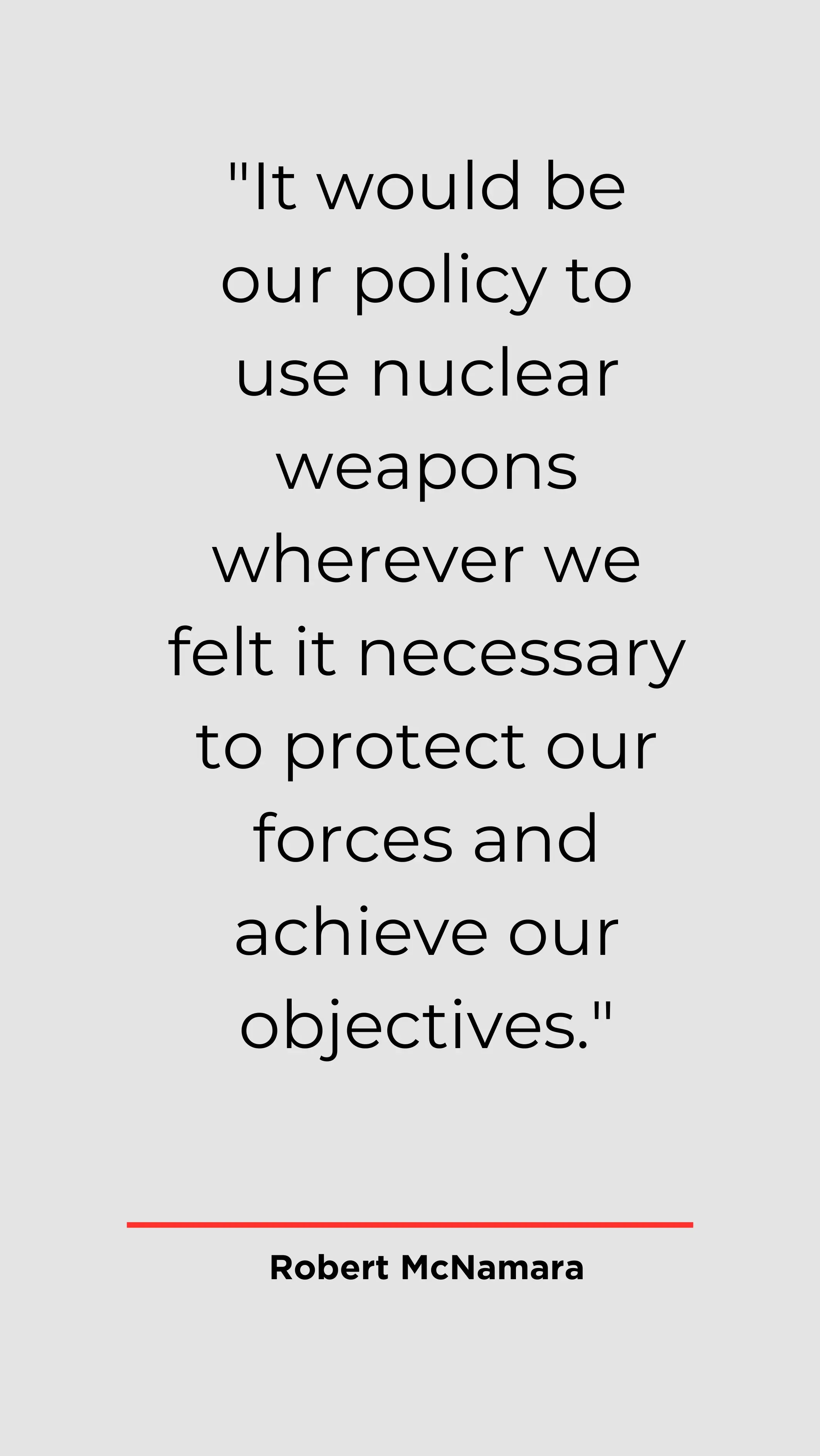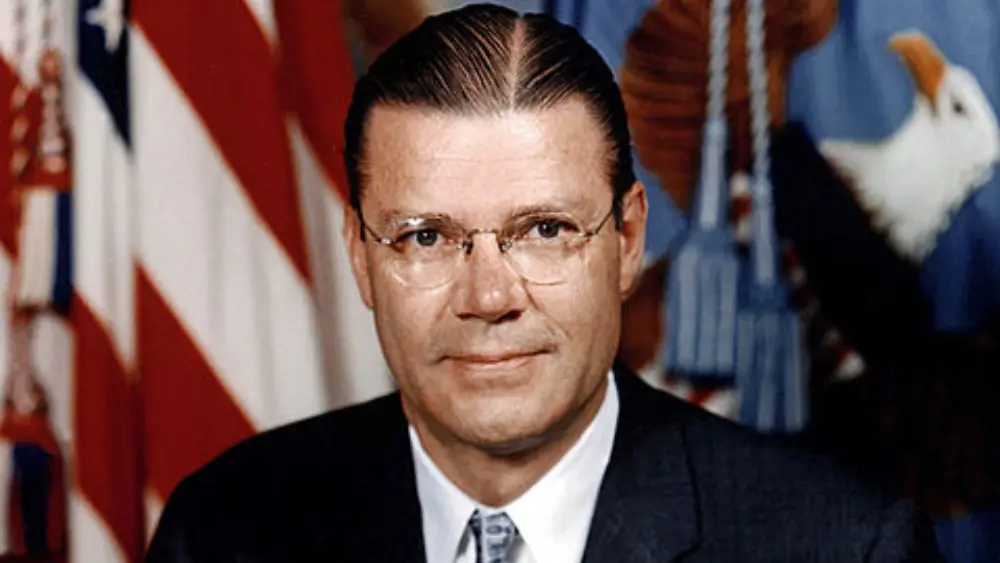Robert Strange McNamara, born on June 9, 1916, in San Francisco, California, was a prominent American business executive and government official who played a pivotal role in shaping American defense policies during the Cold War. McNamara’s career spanned both the corporate world and public service, culminating in his service as the U.S. Secretary of Defense under Presidents John F. Kennedy and Lyndon B. Johnson.
Early Life and Education
Robert McNamara’s early life was characterized by a trajectory of academic excellence that would later shape his career in both the corporate and public sectors. He embarked on his educational journey with a scholarship to the University of California, Berkeley, where he laid the intellectual foundation for his future endeavors. It was at Berkeley that McNamara honed his critical thinking and analytical skills, setting the stage for his later success in complex problem-solving.
Following his undergraduate studies, McNamara pursued further education at the prestigious Harvard Business School, where he earned an M.B.A. This advanced degree in business management provided him with a robust toolkit of strategic and organizational skills that would prove invaluable throughout his career. McNamara’s early experiences in the business world, notably his time at Ford Motor Company, instilled in him a mindset of efficiency, data-driven decision-making, and pragmatic problem-solving, attributes that would become hallmarks of his tenure as a key figure in defense planning and government service.
Robert McNamara: World War II and Ford Motor Company
World War II provided Robert McNamara with a platform to showcase his exceptional analytical skills and innovative thinking. Serving as an officer in the U.S. Army Air Forces during the war, McNamara made significant contributions by applying statistical analysis to enhance the effectiveness of bomber operations. His ability to extract meaningful insights from data played a crucial role in refining strategies, improving mission success rates, and ultimately contributing to the Allied victory. McNamara’s early experiences in the military marked the beginning of a career characterized by a relentless pursuit of efficiency and innovation.
Upon the war’s conclusion, McNamara returned to the civilian sector and rejoined Ford Motor Company. It was here that he ascended to prominence as an executive known for his data-driven decision-making. His tenure at Ford was marked by a commitment to applying the principles of modern management and statistical analysis to the automotive industry. McNamara’s innovative approach revolutionized the company’s operations, cementing his reputation as a visionary leader who prioritized efficiency and the rigorous application of data to drive business success. His time at Ford foreshadowed the role he would later play on the national stage, where his analytical prowess would have a profound impact on defense and government policy.
U.S. Secretary of Defense
In 1961, Robert McNamara assumed the pivotal role of U.S. Secretary of Defense under President John F. Kennedy, a position he would continue to hold throughout the tenure of President Lyndon B. Johnson. McNamara’s appointment marked a critical juncture in U.S. defense policy, as he brought with him a unique blend of analytical rigor and innovative thinking. As U.S. Secretary of Defense, McNamara presided over a period of significant transformation in the U.S. military establishment. He championed a doctrinal shift away from the previous strategy of massive retaliation, advocating instead for a more nuanced approach known as “flexible response.” This approach sought to provide a wider range of options for U.S. military action, allowing for a more calibrated and proportionate response to various levels of aggression.
McNamara’s tenure as U.S. Secretary of Defense was characterized by his tireless efforts to modernize and optimize the military’s capabilities and readiness. He prioritized the application of quantitative analysis, cost-benefit assessments, and strategic planning to defense decision-making. This data-driven approach was evident in initiatives such as the McNamara Line, a system of electronic sensors along the demilitarized zone in South Vietnam aimed at detecting and preventing infiltration by North Vietnamese forces. McNamara’s time in office left an enduring mark on U.S. defense policy, illustrating the power of analytical thinking and strategic innovation in shaping the nation’s approach to national security.
Robert McNamara: Crisis Management
Robert McNamara’s time as U.S. Secretary of Defense was defined by his adept handling of a series of pivotal crises that tested the nation’s resolve and leadership. One of the most prominent of these crises was the Cuban Missile Crisis in 1962, a moment when the world teetered on the brink of nuclear war. McNamara’s steady hand and unwavering commitment to analytical rigor played a vital role in achieving a peaceful resolution to this perilous standoff. His ability to assess and interpret intelligence data and his strategic thinking were instrumental in guiding the United States through this precarious chapter of the Cold War.
Yet, McNamara’s tenure also witnessed the escalating challenges of the Vietnam War, a conflict that would go on to become one of the most contentious and divisive in American history. His role in the Vietnam War, marked by controversial decisions and a deeply polarized public opinion, would be a defining aspect of his legacy. While McNamara’s analytical approach continued to inform his decision-making during this protracted conflict, the Vietnam War remained a complex and intractable challenge, and the outcomes of his policies would be deeply scrutinized and debated for years to come.
The Vietnam War
Robert McNamara’s involvement in the Vietnam War has remained a subject of profound contention and debate in American history. During his tenure as U.S. Secretary of Defense, McNamara played a pivotal role in the escalating U.S. involvement in Vietnam. His penchant for data and analysis heavily influenced his approach to the conflict, resulting in a substantial increase in American troops and resources deployed to Vietnam. McNamara’s belief in the feasibility of achieving victory through a combination of military force and counterinsurgency tactics guided many of the decisions that deepened U.S. involvement in Southeast Asia.
However, as the Vietnam War dragged on and the human and financial costs mounted, McNamara’s leadership came under intense scrutiny and faced growing criticism. The protracted and divisive nature of the conflict, coupled with the seemingly elusive goals of U.S. policy, eroded public support and led to widespread protests. McNamara’s resignation as U.S. Secretary of Defense in 1968 marked a significant moment in the history of the Vietnam War, reflecting the profound challenges and complexities of the conflict, and highlighting the enduring controversies surrounding his role in the war’s trajectory.

Robert McNamara: Later Career and Legacy
Following his departure from the Department of Defense in 1968, Robert McNamara embarked on a new phase of his career that took him to the helm of the World Bank, where he served as President for an extended period from 1968 to 1981. In this role, McNamara continued to wield his exceptional skills in management and analysis, albeit in a different arena. During his tenure at the World Bank, he demonstrated a commitment to addressing global economic challenges and supporting development initiatives in many parts of the world, reflecting his enduring dedication to public service and international cooperation.
In his later years, Robert McNamara engaged in a process of reflection and introspection regarding his pivotal role in the Vietnam War. He grappled with the profound moral complexities of the decisions he had made and the consequences that had unfolded as a result. McNamara’s willingness to openly acknowledge and express regret for the war’s human toll and his own role in it added depth to his legacy. His introspection served as a reminder of the enduring personal and ethical struggles that often accompany high-stakes decisions made by leaders on the world stage. McNamara’s legacy, therefore, includes not only his accomplishments in public service but also his willingness to confront the moral questions raised by his actions, making him a figure of historical significance who continues to provoke thoughtful discussion and debate.








